|
De Nederlandse schrijver en cabaretier Kees van Kooten werd geboren op 10 augustus 1941 in Den Haag. Zie ook mijn blog van 10 augustus 2010 en eveneens alle tags voor Kees van Kooten op dit blog.
Uit: Droomvakantie (Het groot bescheurboek)
“Onze stewardess was alleraardigst (we kregen de man twee snoepjes voor het opstijgen), alle koffers kwamen onbeschadigd uit het vliegtuig, we mochten zondermeer doorlopen van de douane, de taxichauffeur was een schat die een schijntje rekende en zo'n mooi hotel hadden we nog nooit gezien.
De bedden waren om nooit meer uit op te staan, alles dééd het in de badkamer en het ontbijt leek wel een diner!
Het hotelpersoneel weigerde fooien aan te nemen, het gebruik van de overdreven gevulde 300 liter-koelkast op de kamer was gratis en als je 's avonds je zwemvliezen voor de deur zette, bleken ze 's ochtends gepoetst!
Wij waren drie weken lang de enigen op het zes kilometer lange, goudgele zandstrand; de ligstoelen, parasols, waterfietsen en sorbets waren gratis; terwijl de zeeëgels een stukje opzij zwommen als ze je zagen aankomen, zodat je niet in ze zou trappen.
Als je terugkwam op je kamer lag het verschoonde bed al opengeslagen, met een bos rozen op je kussen. Er hingen nieuwe schilderijen en op de televisie kon je de hele wereld ontvangen.
We hebben elkaar wel tot zes uur 's ochtens stomdronken op de hotelgang achterna gezeten, zonder dat iemand er iets van zei; de receptionist aan de balie schreef desgewenst de ansichtkaarten naar huis en in het verwarmde zwembad mocht je gewoon dwars door je badpak heen plassen.
's Avonds aan het diner kwam er een gitarist met gewoon zijn gitaar nog in het foudraal langs alle tafeltjes, om te zeggen dat hij, gratis, niet zou spelen.
Autochtoon dansen deden ze daar niet, dus kwam er niemand vragen of je mee wilde doen en daar werden ook nog eens geen foto 's van genomen, die de volgende dag niet voor tien gulden te verkrijgen waren.
Op zondag waren alle winkels, café's, postkantoren, banken en doktoren open. Alleen de begrafenisondernemers waren dicht, dus dan sloegen we die gewoon een dagje over.
Ze hebben daar af en toe een wind die omgevallen glazen weer overeind zet en kranten precies op de goede pagina's openblaast. Drie keer woei er zomaar een prachtig hoedje op mijn hoofd!”
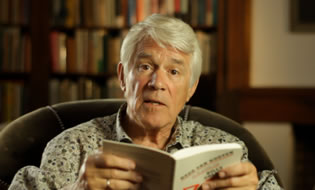
Kees van Kooten (Den Haag, 10 augustus 1941)
De Duitse schrijver Alfred Döblin werd op 10 augustus 1878 geboren in Stettin. Zie ook alle tags voor Alfred Döblin op dit blog en ook mijn blog van 10 augustus 2010
Uit: Berlin Alexanderplatz
“Da war ein Haus, er nahm den Blick weg von dem Pflaster, eine Haustür stieß er auf, und aus seiner Brust kam ein trauriges brummendes oh, oh. Er schlug die Arme umeinander, so mein Junge, hier frierst du nicht. Die Hoftür öffnete sich, einer schlürfte an ihm vorbei, stellte sich hinter ihn. Er ächzte jetzt, ihm tat wohl zu ächzen. Er hatte in der ersten Einzelhaft immer so geächzt und sich gefreut, daß er seine Stimme hörte, da hat man was, es ist noch nicht alles vorbei. Das taten viele in den Zellen, einige am Anfang, andere später, wenn sie sich einsam fühlten. Dann fingen sie damit an, das war noch was Menschliches, es tröstete sie. So stand der Mann in dem Hausflur, hörte das schreckliche Lärmen von der Straße nicht, die irrsinnigen Häuser waren nicht da. Mit gespitztem Munde grunzte er und ermutigte sich, die Hände in den Taschen geballt. Seine Schultern im gelben Sommermantel waren zusammengezogen zur Abwehr.
Ein Fremder hatte sich neben den entlassenen Sträfling gestellt, sah ihm zu. Er fragte: »Ist Euch was, ist Euch nicht gut, habt Ihr Schmerzen?«, bis der ihn bemerkte, sofort mit dem Grunzen aufhörte. »Ist Euch schlecht, wohnt Ihr hier im Haus?« Es war ein Jude mit rotem Vollbart, ein kleiner Mann im Mantel, einen schwarzen Velourshut auf, einen Stock in der Hand. »Ne, hier wohn ich nich.« Er mußte aus dem Flur, der Flur war schon gut gewesen. Und nun fing die Straße wieder an, die Häuserfronten, die Schaufenster, die eiligen Figuren mit Hosen oder hellen Strümpfen, alle so rasch, so fix, jeden Augenblick eine andere.
Und da er entschlossen war, trat er wieder in einen Hausflur, wo man aber die Tore aufriß, um einen Wagen durchzulassen. Dann rasch ins Nachbarhaus in einen engen Flur neben dem Treppenaufgang. Hier konnte kein Wagen kommen. Er hielt den Geländerpfosten fest. Und während er ihn hielt, wußte er, er wollte sich der Strafe entziehen (o Franz, was willst du tun, du wirst es nicht können), bestimmt würde er es tun, er wußte schon, wo ein Ausweg war.”
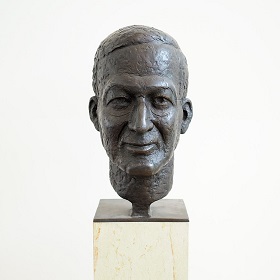
Alfred Döblin (10 augustus 1878 – 26 juni 1957)
Borstbeeld door Siegfried Wehrmeister, 1992
De Oegandese schrijver Moses Isegawa (pseudoniem van Sey Wava)werd geboren op 10 augustus 1963 in Kawempe in Oeganda. Zie ook alle tags voor Moses Isegawa op dit blog en ook mijn blog van 10 augustus 2010.
Uit: Abyssinian Chronicles
“The exodus of wives, relatives, friends and hangers-on had left a big howling lacuna which wrapped the homestead in webs of glorious nostalgia. The fifties and sixties were spanned by that nostalgia and provided us with stories pickled, polished and garnished by memory. Every migrant soul was now a compact little ghost captured in words, invoked from the lacuna by the oracle of Grandpa and Grandma and made to inject doses of old life into our present truncated existence. The hegemony of lacuna'd ghosts in their stories was broken only when the characters, like resurrected souls, braved the dangerous slopes of Mpande Hill and the treacherous papyrus swamps to come and state their case in person. The Fiddler never returned, but was most prevalent because he was immortalized by the poor rendition of his songs Grandpa showered on his homestead as he shaved, as he toured his coffee plantation—the shamba—to supervise work, as he reminisced in the shade and as he wondered how to get a young girl with an old soul to see him through his last days.
Late in the sixties, no one ’5 visit was awaited more eagerly than Uncle Kawayida’s: the man was a wizard, a gold mine full of fascinating and sometimes horrifying tales, a fantastic storyteller endowed with a rare patience who answered my often tedious questions with a cheerful, reassuring face. When he stayed away too long, I became restless and worked out the days and months he was most likely to come. On such days I would climb into the branches of my favorite tree, the tallest jackfruit in the three homesteads, and fix my eyes on the distant Mpande (“Manhood”) Hill. If I was lucky, I would see his motorbike, a blue-bellied eagle encased in silver flashes, glide down the notoriously steep slope and disappear into the umbrella-shaped greenery of the papyrus swamp below. With “ Uncle Kawayida, Uncle Kawayida!” on my tongue, I would speed down the tree-dry, sharp sticks pricking my skin, the sweet hypnotic smell of jackfruit in my nose-and rush into Grandma’s courtyard to break the good news.”
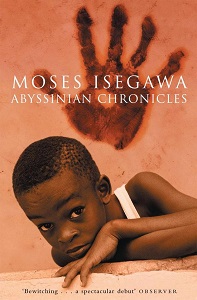
Moses Isegawa (Kawempe, 10 augustus 1963)
Cover
De Amerikaanse dichter en schrijver Mark Doty werd geboren op 10 augustus 1953 in Maryville, Tennessee. Zie ook alle tags voor Mark Doty op dit blog en ook mijn blog van 10 augustus 2010.
Atlantis
2. REPRIEVE
I woke in the night
and thought, It was a dream,
nothing has torn the future apart,
we have not lived years
in dread, it never happened,
I dreamed it all. And then
there was this sensation of terrific pressure
lifting, as if I were rising
in one of those old diving bells,
lightening, unburdening. I didn’t know
how heavy my life had become—so much fear,
so little knowledge. It was like
being young again, but I understood
how light I was, how without encumbrance,—
and so I felt both young and awake,
which I never felt
when I was young. The curtains moved
—it was still summer, all the windows open—
and I thought, I can move that easily.
I thought my dream had lasted for years,
a decade, a dream can seem like that,
I thought, There’s so much more time ...
And then of course the truth
came floating back to me.
You know how children
love to end stories they tell
by saying, It was all a dream? Years ago,
when I taught kids to write,
I used to tell them this ending spoiled things,
explaining and dismissing
what had come before. Now I know
how wise they were, to prefer
that gesture of closure,
their stories rounded not with a sleep
but a waking. What other gift
comes close to a reprieve?
This was the dream that Wally told me:
I was in the tunnel, he said,
and there really was a light at the end,
and a great being standing in the light.
His arms were full of people, men and women,
but his proportions were all just right—I mean
he was the size of you or me.
And the people said, Come with us,
we’re going dancing. And they seemed so glad
to be going, and so glad to have me
join them, but I said,
I’m not ready yet. I didn’t know what to do,
when he finished,
except hold the relentless
weight of him, I didn’t know
what to say except, It was a dream,
nothing’s wrong now,
it was only a dream.
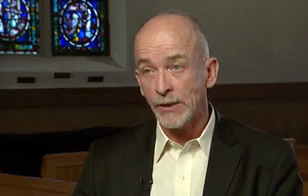
Mark Doty (Maryville, 10 augustus 1953)
De Poolse schrijver Jerzy Pilch werd geboren op 10 augustus 1952 in Wisla. Zie ook alle tags voor Jerzy Pilch op dit blog en ook mijn blog van 10 augustus 2010.
Uit: His Current Woman (Vertaald door Bill Johnston)
“Or at the very least I should have a serious heart-to-heart with her. I mean, during these few weeks we’ve never really had a decent talk. I told one lie afier another and shewent on and on about literature, Kohoutek admits to himself.
What’s to be done? Where can I put her? A hotel is out of the question, since everyone would know all about it at once. The entire town, inhabited as it is exclusively by adherents of the Lutheran faith, would know the whole story immediately. Maybe- the glimmer of a vague notion brightens Kohoutek’s mind-maybe she could be passed off as a vacationer, and maybe they could be persuaded to rent out a room to her? After all, for years there’s beenm talk of the money to be made from renting out rooms; every year hundreds of summer visitors ask if there are rooms to rent and are met with a sneering rebuff. Every time there’s someone who won’t agree to it, either Kohoutek’s folks, or Oma, or Miss Wandzia’s mother-though she rents a room herself, she’s opposed to the other rooms being rented. But no one will agree, thinks Kohoutek, to my current woman.When they see her in that little curio of a hat, as one man they’ll all be opposed to her renting a room even for an hour. What’s to be done? thinks Kohoutek feverishly. Howlong will she be staying in the attic? I mean, she needs certain comforts; she has to wash, use the bathroom. How will I be able to handle all that? How could she do this to me?
All at once the floor creaked and Kohoutek sat bolt upright, because he thought he saw his current woman standing at the foot of his bed.“
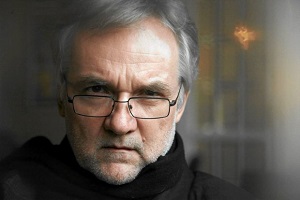
Jerzy Pilch (Wisla, 10 augustus 1952)
Zie voor nog meer schrijvers van de 10e augustus ook mijn blog van 10 augustus 2014 deel 2 en eveneens deel 3.
10-08-2015 om 18:35
geschreven door Romenu 
Tags:Kees van Kooten, Alfred Döblin, Moses Isegawa, Mark Doty, Jerzy Pilch, Romenu
|

